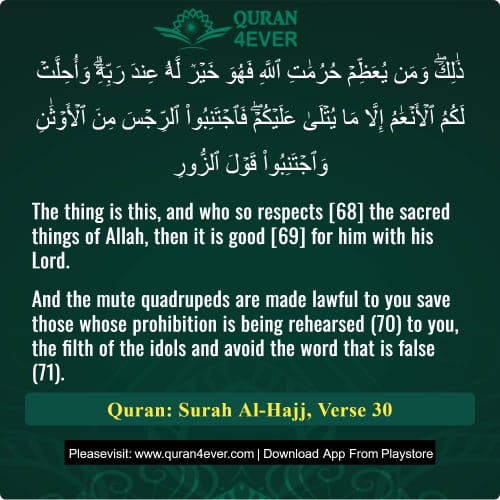
Transliteration:( Zaalika wa mai yu'azzim hurumaatil laahi fahuwa khairul lahoo 'inda Rabbih; wa uhillat lakumul an'aamu illaa maa yutlaa 'alaikum fajtanibur rijsa minal awsaani wajtaniboo qawlaz zoor )
"The thing is this, and whoso respects [68] the sacred things of Allah, then it is good [69] for him with his Lord. And the mute quadrupeds are made lawful to you save those whose prohibition is being rehearsed [70] to you, the filth of the idols, and avoid the word that is false. [71]"
This includes veneration for:
The Holy Ka‘ba
The Qur’an
The month of Ramadaan
Masjid al-Haram, Madina, and
Every Sunnah of the Prophet ﷺ
Honoring these is, in essence, respecting Allah Himself.
Worship without reverence has no worth.
True worship is built on respect and love.
Even Iblis’s worship was rejected due to his lack of respect for Adam (peace be upon him).
Animals are generally lawful, except those clearly prohibited, as in Surah Ma’idah (5:3):
e.g. dead meat, blood, etc.
Stay away from idolatry, false beliefs, lying, and unlawful earnings—all of which are forms of filth and false speech.
30.Such (is the Pilgrimage): whoever honours the sacred rites of Allah, for him it is good in the Sight of his Lord. Lawful to you (for food in Pilgrimage) are cattle, except those mentioned to you (as exception): but shun the abomination of idols, and shun the word that is false.
There is no further commentary available on this verse by Ibn Kathir
(22:30) Such (was the purpose of building the Kabah). Whosoever, then, venerates Allah’s sanctities will find it to be good for him in the sight of his Lord.[54] Cattle have been made lawful for you[55] except those mentioned to you (as unlawful).[56] So shun the abomination of idols[57] and shun all words of falsehood.[58]
54. Though the command is of a general nature, here it refers particularly to the prohibitions which are connected with the Sacred Mosque, Hajj, Umrah and Makkah. Incidentally, there is a subtle hint in it to the Quraish; who had driven out the Muslims from Makkah and debarred them from Hajj and violated the sanctity of the Ancient House by associating indecent, filthy, and ungodly rites with Hajj and the House in contradiction to the ways of Abraham.
55. “And the cattle have been made lawful for you” has been cited here for two objects.
(1) It is to refute the custom of the Quraish under which certain cattle, bahirah. saibah, wasilah and ham, were considered unlawful. They are being told that these are also lawful like other cattle.
(2) It is not unlawful as was held by the Quraish to eat the flesh of the cattle even in the state of Ihram.
56. This refers to (Surah Al-Anaam, Ayat 145) and (Surah An-Nahl, Ayat 115) in which Allah has forbidden the Muslims to eat what dies of itself, blood, flesh of swine or what has been slaughtered in any name other than Allah’s.
57. That is, refrain from and guard against the worship of idols just as you avoid filthy and dirty things.
58. Though the expression “false speech” is general and implies lies, false evidence, calumny, etc., here it particularly refers to those false creeds, rites, and rituals and superstitious things on which kufr and shirk have been founded. It is obvious that there is no greater lie than associating others with Allah in His Being, Attributes, Powers and Rights. It was a falsehood to make bahirah, etc. unlawful. See also (Surah An-Nahl, Ayat 116).
To take a false oath and give a false evidence also come under this commandment. A tradition from the Prophet (peace be upon him) says:
A false evidence is equal to shirk with Allah. That is why according to the Islamic Law, a false witness should be punished and disgraced. Imams Abu Yusuf and Muhammad have expressed the opinion that a person who brings a false witness in the court should be publicly exposed and sentenced to a long imprisonment. This was the actual practice in the time of Umar. According to Makhul, he said:
Such a person should be whipped, his head shaved and face blackened and he should be sentenced to a long imprisonment.
Abdullah bin Amir has reported from his father that a person’s false evidence was established in Umar’s court, whereupon the Caliph kept him exposed to public for a day, saying that he was so and so and a false witness so that people might recognize him, and then he imprisoned him. These days this can be done by publishing the culprit’s name in the newspapers, etc.
[925]- See 5:3.

For a faster and smoother experience,
install our mobile app now.
Related Ayat(Verses)/Topics